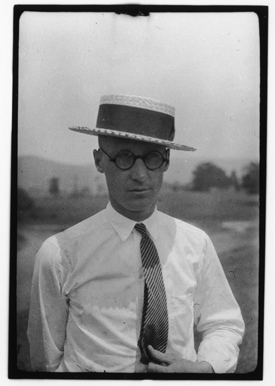Beyond the Headlines
Air Date: Week of March 13, 2020

Monsanto’s best known product, Roundup, is associated with thousands of court cases alleging the herbicide’s key ingredient, glyphosate, is associated with the plaintiffs' cancer diagnoses. (Photo: Mike Mozart, Flickr, CC BY 2.0)
For this week's trip beyond the headlines, Environmental Health News Editor Peter Dykstra and Host Steve Curwood look at the massive liabilities that Bayer is facing now that it owns Monsanto, maker of Roundup. Then, the two look at an unintended consequence of the coronavirus: a drop in carbon emissions. Finally, a look back through the history books to a moment that led to the famous Scopes Monkey Trial on evolution.
Transcript
CURWOOD: On the line now with me from Atlanta, Georgia is Peter Dykstra. Peter's an editor with Environmental Health News, that's EHN.org and DailyClimate.org. Hey Peter, what do you have for us this week?
DYKSTRA: Well, there's a company that's known mostly in this country for aspirin that has a big headache. That's Bayer, the German multinational. A couple of years ago, they took over Monsanto, the St. Louis-based chemical giant. $63 billion was the cost of the takeover. They thought they were sitting pretty with a product like Roundup, the supposedly safe herbicide. Farms bought it, institutions bought it, landscapers, land owners. But then some studies came out linking glyphosate, Roundup's key ingredient, potentially to cancer. That prompted lawsuits. There were a few huge victories where juries awarded glyphosate victims tens of millions of dollars, and that opened the floodgates.
CURWOOD: Yeah, I think even now you can watch late-night television and see ads from lawyers that say, hey, if you were exposed to Roundup and you have cancer, give us a call.
DYKSTRA: That's right. But Bayer got hit really hard in ways it didn't expect. There are now 48,000 Roundup plaintiffs, either in individual suits or class action suits. Wall Street analysts say Bayer could be facing up to $10 billion in payouts and their stock is down by 31%. The CEO of Bayer has announced his resignation. He'll be leaving next month.
CURWOOD: Okay, Peter, what else do you have for us this week?
DYKSTRA: A little story about unintended consequences. The novel coronavirus could lead to a halt in the growth of greenhouse gas emissions. Emissions are already way down in China. And the plummeting stock prices around the world reflect a drop in demand, and oil and gas stocks taking it on the chin.
CURWOOD: Well, some places are almost in a complete shutdown. Try Italy for example.

Several governments, including the European Union and the United States, have temporarily halted their "ghost flight" rule during the coronavirus pandemic. (Photo: Philip Morris, Flickr, CC BY-ND 2.0)
DYKSTRA: Yeah, the shut down means no air travel, restricted car travel. Some airlines have already reported a 70% drop in booked flights. And that, of course, is going to hit the bottom line for airlines. And here's one little side note. There's something called ghost flights within the airline industry. In many countries around the world, there are prized landing and takeoff slots that airlines will just fight tooth and nail to keep. If they don't fly those slots, due to reduce demand, they could lose them under current rules. So several airlines are flying ghost flights, empty planes carrying no passengers from city to city, just so they don't lose their takeoff and landing rights.
CURWOOD: Well, that won't help the carbon situation though, huh?
BASCOMB: It makes a carbon footprint without actually walking anywhere.
CURWOOD: But surely people are coming to their senses about this.
DYKSTRA: Yes and midweek both the EU and the US announced that they're suspending the rule, so that airlines won't have to make the ghost flights to keep their landings spots.
CURWOOD: All right, Peter. Now's the moment that we take a look back at history and I want you to tell me what you see.
DYKSTRA: Something that happened 95 years ago, Steve, you and I remember it well. March 13, 1925, the Tennessee legislature passed the Butler Act. It made teaching evolution a misdemeanor crime, imposed fines for anyone who taught evolution in any public school or college in the state of Tennessee. Only six of the state's 30 senators gave the measure an opposable thumbs down.
CURWOOD: Oh, Peter. Hey, so what happened after that?

John T. Scopes, a month before being put on trial for the crime of teaching evolution in public schools. (Photo: Watson Davis, Smithsonian Institution, Flickr, Public Domain)
DYKSTRA: Well, the law took effect six days after it was passed. And in May, advocates of teaching evolution recruited a substitute teacher named John Scopes to teach evolution at the high school in Dayton, Tennessee. He was immediately arrested, later convicted under the law in the famous Scopes Monkey Trial. His token fine was reversed later on. But the Butler Act stayed on the books in Tennessee for over 40 years. It was finally repealed in 1967. A year after that, in '68, the United States Supreme Court declared all such laws to be unconstitutional.
CURWOOD: I wish there were a law against monkey business overall in our government operations. Thanks, Peter. Peter Dykstra's an editor with Environmental Health News, that's EHN.org and DailyClimate.org. We'll talk to you again real soon.
DYKSTRA: Okay, Steve, thanks a lot. Talk to you soon.
CURWOOD: And there's more on these stories at the Living on Earth website, LOE.org.
Links
Reuters | “Bayer Chairman Quits as Roundup Settlement Talks Progress”
Click here for the History.com article on the Scopes Monkey Trial
Living on Earth wants to hear from you!
Living on Earth
62 Calef Highway, Suite 212
Lee, NH 03861
Telephone: 617-287-4121
E-mail: comments@loe.org
Newsletter [Click here]
Donate to Living on Earth!
Living on Earth is an independent media program and relies entirely on contributions from listeners and institutions supporting public service. Please donate now to preserve an independent environmental voice.
NewsletterLiving on Earth offers a weekly delivery of the show's rundown to your mailbox. Sign up for our newsletter today!
 Sailors For The Sea: Be the change you want to sea.
Sailors For The Sea: Be the change you want to sea.
 The Grantham Foundation for the Protection of the Environment: Committed to protecting and improving the health of the global environment.
The Grantham Foundation for the Protection of the Environment: Committed to protecting and improving the health of the global environment.
 Contribute to Living on Earth and receive, as our gift to you, an archival print of one of Mark Seth Lender's extraordinary wildlife photographs. Follow the link to see Mark's current collection of photographs.
Contribute to Living on Earth and receive, as our gift to you, an archival print of one of Mark Seth Lender's extraordinary wildlife photographs. Follow the link to see Mark's current collection of photographs.
 Buy a signed copy of Mark Seth Lender's book Smeagull the Seagull & support Living on Earth
Buy a signed copy of Mark Seth Lender's book Smeagull the Seagull & support Living on Earth

